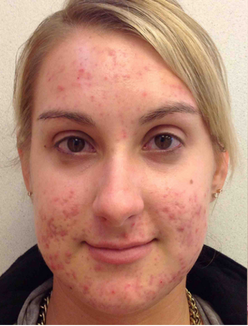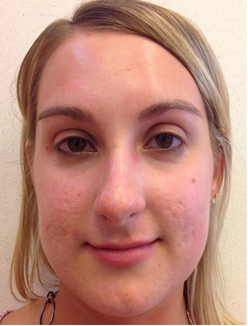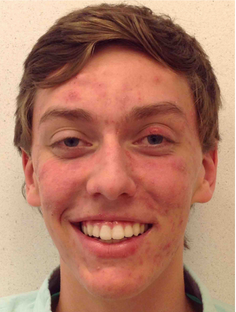Sometimes, a good skin care routine isn’t enough to clear up acne. You may need antibiotics or other acne treatments that can only be prescribed by a physician or dermatologist. One of those treatments is known as Accutane, or isotretinoin.
Since acne is a unique condition, and symptoms vary from person to person, you and a board-certified dermatologist should discuss whether Accutane is right for you.
Drs. Joel and Daniel Schlessinger, board-certified dermatologists, Mohs surgeons and cosmetic surgeons, have years of experience evaluating and treating acne for the best patient outcomes. In this blog, we’ll discuss details of Accutane treatment, including:
- How does Accutane work?
- How long does Accutane take to work?
- What is an Accutane purge?
- Accutane pros and cons
- What’s the difference between tretinoin vs. isotretinoin?
- Accutane before and afters
How does Accutane work?
Accutane is a very concentrated form of vitamin A that comes in capsule form. Vitamin A is found naturally in the body and in some foods, but taking this form of it by mouth in a highly concentrated dose is incredibly effective at treating acne. “Accutane works by reducing the sebum that is in your glands, which in turn decreases the ‘food’ for acne and the normal inhabitants of your acne-related glands,” Dr. Joel Schlessinger says.
Some forms of acne can be treated with prescription-strength skin care products and antibiotics, but if your acne isn’t responding to treatments like these, it may be time to consider Accutane. While it can be greatly beneficial, it may not be the best fit for everyone.
“We don’t prescribe Accutane to individuals who are unwilling or unable to guard against pregnancy and are people of childbearing age, as isotretinoin can cause severe birth defects. We are also cautious of prescribing it to individuals with serious concerns for depression or suicide, only using it in coordination with their psychiatrist or mental health professional,” Dr. Joel Schlessinger says.
It’s ideal for moderate to severe acne that has not improved with other treatments. Depending on the case and severity, it can also be beneficial for acne scarring.
How long does Accutane take to work?
As part of your daily routine, patients generally take it once to twice daily. The dosing is dependent on your body weight, and how long you take it depends on your unique concerns and results.
“Usually, we will start to see benefits within the first month or two, but to get the best results, you should stay on it for at least five to six months at a fairly high dose. This will often result in remission (complete improvement) of acne for at least six months to a few years. Often, it will lead to a complete cure if hormones are in play and patients are nearing the end of massive swings in hormones of adolescence,” Dr. Joel Schlessinger says.
Dr. Daniel Schlessinger adds, “Since Vitamin A is a fat-soluble vitamin, it’s important to take it with a fatty meal, so it can be fully absorbed into your body. Although, some versions are better absorbed even without a fatty meal now. Our clinic worked on one, Absorbica, during their clinical trials.” It is also recommended to take it with a full glass of water to avoid irritating the esophagus.
What is an Accutane purge?
When you first start taking isotretinoin, you may experience what’s called an “Accutane purge.” An Accutane purge is a short period that occurs as you start taking isotretinoin, when breakouts may increase.
“We have a special approach to starting Accutane that often totally avoids this purge, leaving people with a smooth transition from acne to no acne. It is rare for other practices to do this, but we find more than 90% of our patients never have a purge,” Dr. Joel Schlessinger says.
“This approach involves treating any bacterial or yeast infections prior to Accutane and a gentler approach to the initial Accutane dosage, among other methods we use,” he continues.
Pros and cons of Accutane
Accutane can be a major help when it comes to persistent acne. “Bar none, it’s the best treatment for acne,” Dr. Daniel Schlessinger says. “But it also has many side effects to monitor for, some of which are serious, such as potential for worsening depression or suicidal thoughts, an increase in inflammatory bowel disease symptoms and the risk for brain swelling that leads to headaches and blurry vision. For this reason, it isn’t the first thing we reach for when we see someone with acne and we usually try to calm down the acne as much as we can with other methods before starting Accutane. In the right patients, though, it is an incredible treatment that avoids or even reverses scarring and serious acne-related skin issues.”
“When administered correctly,” Dr. Joel Schlessinger continues, “Our patients usually see great improvements. There is an art to it, so not every practitioner administers it the same way and achieves the same results.”
Invariably, patients will have dry skin and some joint pains, which can be easily managed and don’t cause too many problems. However, it does require some guidance. Dr. Daniel Schlessinger came up with the idea for FixMySkin 1% Hydrocortisone Healing Balms when he took isotretinoin as a teenager to combat some of those concerns.
“Dealing with the dry, cold winters compounded with the effects of isotretinoin, I was in need of an easy solution,” Dr. Daniel Schlessinger says. “We put all of our Accutane patients on FixMySkin, and they love it. FixMySkin can be used on the face, hands, lips and body, so any areas of irritation can be soothed,” he continues.
Joint pain is also common but can usually be improved with medications like ibuprofen or other non-steroidal anti-inflammatory agents.
One of the most important things to consider with Accutane, though, is the necessity to avoid pregnancy during treatment. “Accutane is teratogenic, which means it can cause severe birth defects to an exposed unborn fetus,” Dr. Joel Schlessinger says.
All patients taking Accutane are required to enroll in the the iPLEDGE Program, which is a federally mandated system to ensure safety around Accutane usage. For patients who are capable of becoming pregnant, the program requires monthly pregnancy tests throughout treatment and the pledge to use two forms of birth control during and before treatment.
“It’s also integral to keep an eye on your mood during Accutane treatment, as depression and even suicidal ideation can be a concern. With appropriate concern and management, most problems with Accutane are easily avoided or treated,” Dr. Joel Schlessinger says.
Lastly, Accutane can interfere with wound healing and increase the risk of scarring for procedures performed during Accutane usage. “We recommend that our Accutane patients avoid elective procedures or trauma to the skin, including wisdom teeth extractions, tattoos, piercings or laser resurfacing during the course of treatment and for several months after finishing the treatment,” says Dr. Daniel Schlessinger.
Accutane is usually an affordable option when purchased with health insurance. Even without insurance, it costs about $150 a month at discount pharmacies.
What’s the difference between tretinoin vs. isotretinoin?
There are many forms of vitamin A, some of which can be taken orally (like Accutane). There are other forms of vitamin A you can apply topically, like tretinoin or differin, which are retinoids. In fact, many dermatologists recommend starting a retinoid after Accutane treatment to extend your results. If you’re wondering about the difference between tretinoin vs. isotretinoin, think of them as an oral treatment vs a topical treatment. Tretinoin, or Retin-A, is a topical form you apply to your skin at night. Isotretinoin, however, is the capsule form you take twice daily known as Accutane.
Accutane before and after
While individual results will vary based on the severity of your acne or scarring, we’re familiar with good Accutane results at Schlessinger MD. We have been treating acne patients for over 25 years and have many Accutane before and after photos to show the range of results.
We look forward to taking part in your acne journey. Visit our appointment portal to schedule a consultation today.



